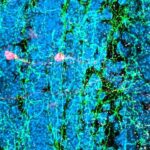Lien vers Pubmed [PMID] – 38499657
Lien vers HAL – pasteur-04548523
Lien DOI – 10.1038/s41380-024-02504-w
Mol Psychiatry 2024 Aug; 29(8): 2527-2542
In most mammals, new neurons are not only produced during embryogenesis but also after birth. Soon after adult neurogenesis was discovered, the influence of recruiting new neurons on cognitive functions, especially on memory, was documented. Likewise, the late process of neuronal production also contributes to affective functions, but this outcome was recognized with more difficulty. This review covers hypes and hopes of discovering the influence of newly-generated neurons on brain circuits devoted to affective functions. If the possibility of integrating new neurons into the adult brain is a commonly accepted faculty in the realm of mammals, the reluctance is strong when it comes to translating this concept to humans. Compiling data suggest now that new neurons are derived not only from stem cells, but also from a population of neuroblasts displaying a protracted maturation and ready to be engaged in adult brain circuits, under specific signals. Here, we discuss the significance of recruiting new neurons in the adult brain circuits, specifically in the context of affective outcomes. We also discuss the fact that adult neurogenesis could be the ultimate cellular process that integrates elements from both the internal and external environment to adjust brain functions. While we must be critical and beware of the unreal promises that Science could generate sometimes, it is important to continue exploring the potential of neural recruitment in adult primates. Reporting adult neurogenesis in humankind contributes to a new vision of humans as mammals whose brain continues to develop throughout life. This peculiar faculty could one day become the target of treatment for mental health, cognitive disorders, and elderly-associated diseases. The vision of an adult brain which never stops integrating new neurons is a real game changer for designing new therapeutic interventions to treat mental disorders associated with substantial morbidity, mortality, and social costs.


